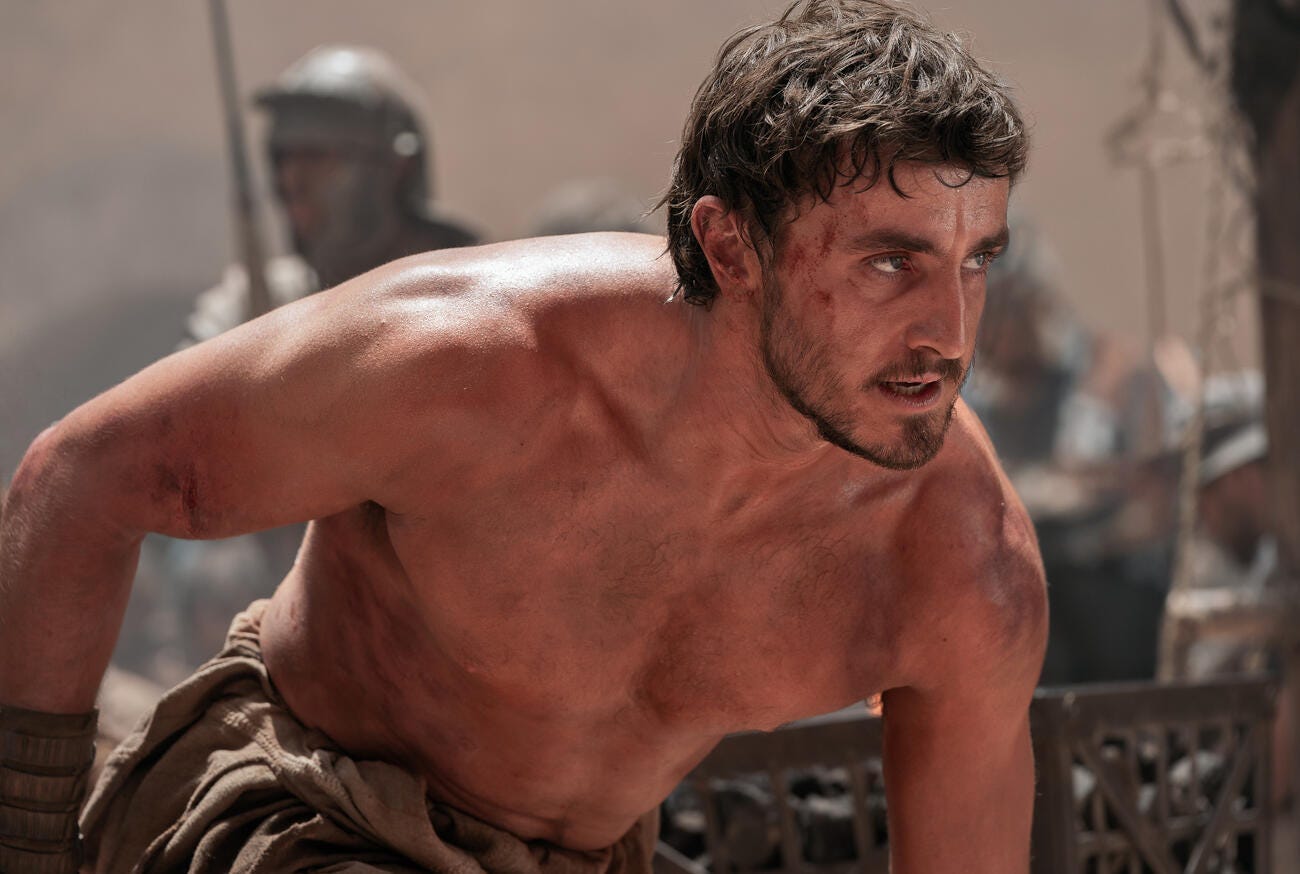'Gladiator II' is exciting, but completely ephemeral
I had forgotten almost everything about the film by the next morning.
Gladiator II, director Ridley Scott’s 24-years-later sequel to his Oscar-winning sword-and-sandal epic from 2000, is exciting, visually appealing, and features a half-dozen outstanding action setpieces.
But beneath all that, the film is uncommonly hollow and ephemeral. By the next morning, I had forgotten almost everything about it.
Arriving in the spring of 2000, the original Gladiator was a phenomenon, featuring a strong performance from a Russell Crowe then at the height of his movie star powers and a rising Joaquin Phoenix as a hissing (and hissible) villain. It won the Best Picture Oscar, made lots of money, and was a key film in the early DVD revolution.
Crowe’s character, Maximus, memorably died at the end, so he’s not back for the sequel, and bringing him back as a fatherly apparition would have looked a little too much like his turn as Jor-El in Man of Steel.
So instead, the new Gladiator, written by David Scarpa, is set a generation later and focused on Maximus’ exiled son Lucious (Paul Mescal), who has been sold into slavery and finds himself in the same gladiatorial pits where his father once toiled.
Connie Nielsen returns as his mother, Lucilla, now coupled with Roman general Marcus Acacius (Pedro Pascal.)
So we once again have a hero mourning (and avenging) his murdered family and a loathsome, sniveling Roman emperor (two of them, in fact—Fred Hechinger and Joseph Quinn, playing the twins Geta and Caracalla, both obviously channeling Jack Gleason’s King Joffrey from Game of Thrones). And it’s not the only thing in the film that recalls that show, starting with the presence of the Viper himself, Pascal.
The other major character is Macrinus (Denzel Washington), a man at court who supevises the gladiators but spends most of the film scheming behind the scenes. It’s a fine performance that recalls the actor’s recent turn in Joel Coen’s The Tragedy of Macbeth, except this time he doesn’t require a Lady to inspire his schemes.
Ultimately, the problem is that there are just too many main characters here, and much more plot than is necessary. The action scenes are, for the most part, fantastic — especially one in which the Roman coliseum is converted into a shark pit — but it can’t overcome both the overbaked plot and the sense that none of this really matters.
Also, the CGI is a bit laughable at times, especially in a scene in which the gladiators are made to fight monkeys.
Paul Mescal is a soulful actor, best known for starring in sensitive dramas like Aftersun and All of Us Strangers, and isn’t the most intuitive choice to serve as an action star.
Early skeptics of Gladiator II have been largely critical of Mescal’s performance, but I thought he was fine. They’re wrong- as are the influencer types who provided “early reactions” to the new film and treated like a masterpiece of the highest order (you should never, ever trust those.)
More of an issue is that Denzel Washington is a much better actor than everyone around him, and he also seems to be having a lot more fun than the other performers. Also, the film has an unfortunate tendency to make every male supporting character an effeminate caricature.
All that said, it’s impressive that Ridley Scott remains this prolific, mounting these massive projects while in his 80s. Some of them — like House of Gucci and The Last Duel — have even been outstanding, although last year’s Napoleon was a slog, and I refuse to let “wait until you watch the Director’s Cut that’s two hours longer” be a defense of a movie I disliked.
If Scott has one more masterpiece in him, I wouldn’t be shocked, but Gladiator II is not it.


